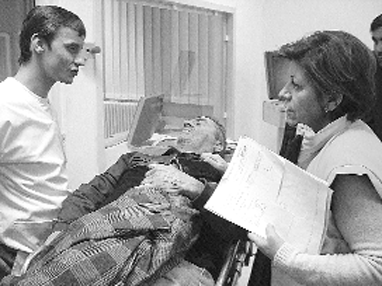A forsaken soul’s last hours add up to movie magic
In some ways it’s not surprising that “The Death of Mr. Lazarescu” is the first Romanian feature film to see U.S. theatrical release in over a decade. The medium took hold fitfully in Romania, not gaining real traction until the postwar era, and never experienced anything like the catalytic effulgences of the Czechoslovak New Wave or the Yugoslav Black Wave.
Hen’s teeth such as Liviu Ciulei’s “Forest of the Hanged” or Dan Pita and Mircea Veroiu’s “Stone Wedding” stood out against often prosaic studio fare and peculiar genre mutations like the Transylvanian Western. The 1989 toppling of Ceausescu’s Stalinist regime occasioned a drift only recently and partially reversed by glimmers like Radu Mihaileanu’s “Train of Life” and Sinisa Dragin’s Tiger Award-winning “Every Day God Kisses Us on the Mouth.”
But nothing in the recent crop, however heartening, prepared us for the verist masterpiece that is Cristi Puiu’s “The Death of Mr. Lazarescu,” opening here almost a year after collecting the Prix Un Certain Regard at Cannes. Puiu’s deceptively plain sophomore feature evinces a subtlety of facture, a fullness of compassion, and a wisdom that place it in the first rank of critical-humanist European narrative cinema.
The story outline couldn’t be simpler. A dilapidated pensioner, Dante Remus Lazarescu (Ion Fiscuteanu), is home alone with the cats in the amber fug of his Bucharest flat. When a migraine and abdominal pains grow too racking, he reluctantly calls for an ambulance. Once the paramedics finally arrive, he’s shunted all night among hospitals overloaded with casualties from a ghastly highway accident. Between jaunts his condition worsens, and by the time he’s berthed for surgery in the wee small hours, it becomes clear that his passing is at hand.
In Puiu’s rendering, this outline becomes a welter of incident covered in patient handheld takes that seep dramatic detail. Kim Wilde posters in the bedroom evoke a long-absent daughter. Nattering pundits on TV reference Gheorghe Ciuhandu, a loser in Romania’s 2004 presidential elections, locating the film pointedly in the now. Waiting for the ambulance, Lazarescu phones his sister Eva, and from their wrangling we start to decipher a history of sedimented recriminations and irreconcilable estrangements.
He rings at the neighbors’ to ask for a palliative; while waiting on the stairwell landing—the couple darts around inside, a plume of smoke wafting from the kitchen as an electro bass thumps from some upper floor—the timed overhead light keeps clicking off. Indeed, in the film’s early moments, Puiu repeatedly shows Lazarescu in darkness, emerging from shadowy portals, or cuts straight to black—presaging the final cut—just a few frames before the homebody flicks on a switch as he enters a room.
The narrative develops in essentially orchestral manner, moving from Lazarescu’s solo overture through an increasingly complex “instrumentation” as the supporting ensemble fills in, and progressing through a series of intensities at the various hospitals before an unforgettable closing diminuendo. Several actors even seem cast for their chromatic qualities. Near the end, for example, as zombified ER nurses admit Lazarescu after hours of processing crash victims, a petite doctor springs out of a corner like a wrathful Erinys, scything the predawn hush with a raven’s caw.
The two leads, Fiscuteanu and Luminita Gheorghiu as the matronly paramedic Mioara, perform at a stratospheric level, and the ensemble is uniformly tight. The pungency in casting down to the smallest parts, each convincingly wrapped in their own woe, recalls Minnelli’s vivid back-lot extras or Altman’s multitudinous arks. Lazarescu’s reproachful, pitying neighbors—the walrus Sandu and his wife Miki, who rinses the vomit from Lazarescu’s slippers and offers to pack some moussaka for his hospital stay—could carry their own sequel.
If the film’s cardinal themes are mortality and callousness, another concern is the finitude of medical knowledge. Lazarescu’s symptoms are repeated so often you’ll be able to recite them to the ushers while exiting, but can anyone definitively explain what’s ailing him? Puiu and Razvan Radulescu’s script quietly flaunts the ambiguity of his condition. Diagnoses are inferred piecemeal from protean symptoms along a daisy chain of haggard medics, flinty nurses, and imperious doctors; not until three-quarters into the film does a CAT scan begin to identify the malady.
The film ends uncomfortably close to where the 2003 documentary “A Certain Kind of Death” begins, with vagrants found dead in squalid SROs. Set a world away in Los Angeles, poverty and isolation remain much the same, and but for a slight script edit, Mr. Lazarescu could have landed in potter’s field, the terminus of “A Certain Kind.” As it is, his summoned sister will arrive too late, headed for the wrong hospital. He will go, we imagine, to some spot reserved next to his long-departed Hungarian wife, whose name he mutters in delirium before losing speech. His cats will soon scavenge for food. His adult daughter, far off in Canada, may never kneel at his grave.
These and many other things are sown in the imagination and stab the conscience while watching “Mr. Lazarescu,” and long afterward. Refusing answers, it asks all the good questions. In an interview for Film Comment, Puiu jokingly demurred at comparisons with Chekhov, but like that physician’s works, “Mr. Lazarescu” also heals. The abandoned widower in a remote Balkan metropolis is both irreducibly alien and unmistakably our own. And of course, we’re going his way.
gaycitynews.com



































